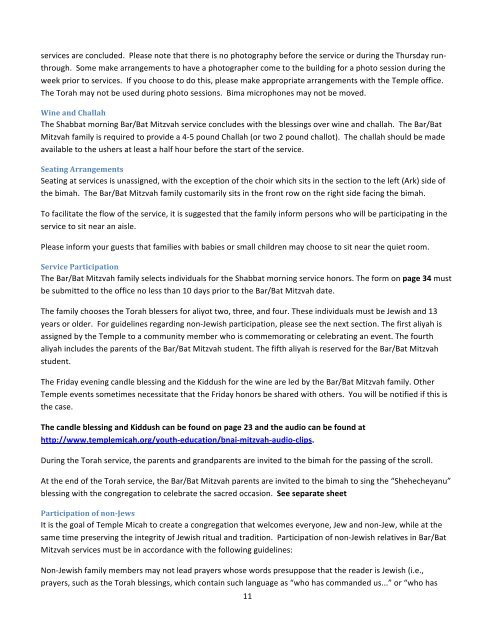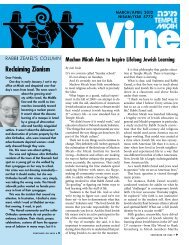Bar/Bat Mitzvah Handbook - Temple Micah
Bar/Bat Mitzvah Handbook - Temple Micah
Bar/Bat Mitzvah Handbook - Temple Micah
You also want an ePaper? Increase the reach of your titles
YUMPU automatically turns print PDFs into web optimized ePapers that Google loves.
services are concluded. Please note that there is no photography before the service or during the Thursday run-‐<br />
through. Some make arrangements to have a photographer come to the building for a photo session during the<br />
week prior to services. If you choose to do this, please make appropriate arrangements with the <strong>Temple</strong> office.<br />
The Torah may not be used during photo sessions. Bima microphones may not be moved.<br />
Wine and Challah<br />
The Shabbat morning <strong>Bar</strong>/<strong>Bat</strong> <strong>Mitzvah</strong> service concludes with the blessings over wine and challah. The <strong>Bar</strong>/<strong>Bat</strong><br />
<strong>Mitzvah</strong> family is required to provide a 4-‐5 pound Challah (or two 2 pound challot). The challah should be made<br />
available to the ushers at least a half hour before the start of the service.<br />
Seating Arrangements<br />
Seating at services is unassigned, with the exception of the choir which sits in the section to the left (Ark) side of<br />
the bimah. The <strong>Bar</strong>/<strong>Bat</strong> <strong>Mitzvah</strong> family customarily sits in the front row on the right side facing the bimah.<br />
To facilitate the flow of the service, it is suggested that the family inform persons who will be participating in the<br />
service to sit near an aisle.<br />
Please inform your guests that families with babies or small children may choose to sit near the quiet room.<br />
Service Participation<br />
The <strong>Bar</strong>/<strong>Bat</strong> <strong>Mitzvah</strong> family selects individuals for the Shabbat morning service honors. The form on page 34 must<br />
be submitted to the office no less than 10 days prior to the <strong>Bar</strong>/<strong>Bat</strong> <strong>Mitzvah</strong> date.<br />
The family chooses the Torah blessers for aliyot two, three, and four. These individuals must be Jewish and 13<br />
years or older. For guidelines regarding non-‐Jewish participation, please see the next section. The first aliyah is<br />
assigned by the <strong>Temple</strong> to a community member who is commemorating or celebrating an event. The fourth<br />
aliyah includes the parents of the <strong>Bar</strong>/<strong>Bat</strong> <strong>Mitzvah</strong> student. The fifth aliyah is reserved for the <strong>Bar</strong>/<strong>Bat</strong> <strong>Mitzvah</strong><br />
student.<br />
The Friday evening candle blessing and the Kiddush for the wine are led by the <strong>Bar</strong>/<strong>Bat</strong> <strong>Mitzvah</strong> family. Other<br />
<strong>Temple</strong> events sometimes necessitate that the Friday honors be shared with others. You will be notified if this is<br />
the case.<br />
The candle blessing and Kiddush can be found on page 23 and the audio can be found at<br />
http://www.templemicah.org/youth-‐education/bnai-‐mitzvah-‐audio-‐clips.<br />
During the Torah service, the parents and grandparents are invited to the bimah for the passing of the scroll.<br />
At the end of the Torah service, the <strong>Bar</strong>/<strong>Bat</strong> <strong>Mitzvah</strong> parents are invited to the bimah to sing the “Shehecheyanu”<br />
blessing with the congregation to celebrate the sacred occasion. See separate sheet<br />
Participation of non-‐Jews<br />
It is the goal of <strong>Temple</strong> <strong>Micah</strong> to create a congregation that welcomes everyone, Jew and non-‐Jew, while at the<br />
same time preserving the integrity of Jewish ritual and tradition. Participation of non-‐Jewish relatives in <strong>Bar</strong>/<strong>Bat</strong><br />
<strong>Mitzvah</strong> services must be in accordance with the following guidelines:<br />
Non-‐Jewish family members may not lead prayers whose words presuppose that the reader is Jewish (i.e.,<br />
prayers, such as the Torah blessings, which contain such language as “who has commanded us...” or “who has<br />
11



